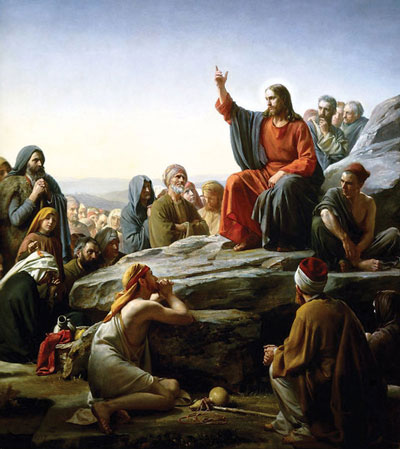
“Sermon on the Mount” – Carl Bloch
The Sermon on the Mount is the beginner’s guide to the kingdom of heaven according to Amy-Jill Levine’s book of the same topic.
Matthew 5:1 tells us that the Sermon is not delivered to outsiders; it’s delivered to four disciples, insiders who have already left their homes and their families in order to follow this Galilean charismatic healer and teach. They could be considered “Jesus Greatest Hits, according to Levine.”<
Jesus begins with a series of nine statements called beatitudes, from the Latin term for “blessed. /p>
Jesus’ words describe the life that believers are to live in relation to one another and to the world.
The Beatitudes, the Gospel for All Saints, Year A begin the Sermon in a manner similar to the way the Ten Commandments introduce the law, so that the analogy to Matthew’s mountain may well be Sinai, with Jesus re-presenting the law as the “New Moses.” There is an A/B pattern of characteristics of the believer with the reward they will receive:
Poor in spirit -> will receive the kingdom of heaven
Mourn -> will be comforted
Meek -> will inherit the earth
Hunger for righteousness –>will be filled
Merciful -> will receive mercy
Pure in heart-> will receive God
Peacemakers-> will see God
Persecuted -> theirs is the kingdom of heaven
Reviled -> will receive blessings
Levine’s book concentrates on the first 3 and summarizes the others:
1. Blessed are the poor in spirit
The poor in spirit are those who see what many don’t, and they are blessed because they have this vision and because the vision compels them to act.
Those who are blessed orient themselves to others and to God and not toward their self-centered concerns
Poor in spirit” is partly a synonym for the people who have enough humility that they do not operate from a sense of pride. The poor in spirit are those who recognize that they are both the beneficiaries of the help of others and part of a system in which they are to pay it forward and help those whom they can. Poor in spirit are those who do not sit around saying, “Look at what I’ve accomplished,” or worse, feel resentful because they have not received what they consider sufficient honor. They know they did the right thing; they know God knows, and that’s sufficient recognition indeed
2. Blessed are those who mourn,
In part those who who mourn are blessed because not everyone can mourn. To mourn is to say, “I loved this person, and I desperately miss this person”—a heart that knows how to grieve is a heart that knows how to love.
We can mourn for many things: the death of a loved one, yes. But we also mourn for the abused child, the victims of the latest terrorist attack, our veterans who gave their lives in defense of our country. And we should take comfort in the fact that we care—because not all do.
3. Blessed are the meek
The “meek” in the beatitude does not mean “insignificant compared to you.”
A meek person promotes servant leadership over despotism. They are people in authority who do not rely on that authority to boss others around.
Only the meek, those who would not use the inheritance to reinforce their own already privileged position, are worthy to care for the land. They understand stewardship, they understand restriction of activity (for what one can do is not necessarily what one should do), and they understand their responsibility in turn to pass the land to others.
Inheriting the earth, or the land, is not a windfall; it is a responsibility. To be the heir of something means that we have been given something treasured. Our job is to be a good steward of that legacy
She summarizes the next 5:
4. Blessed are those who hunger and thirst for righteousness. Those who hunger and thirst for righteousness are those who understand dependence and obligation, loss and memory, power and responsibility
To demand righteousness, which is related, linguistically, to the term for “justice,” should also bring us to mercy.
5. Blessed are the merciful. Justice without mercy is intolerable, but mercy without justice is equally intolerable: actions must have consequences.
6. Blessed are the pure in heart. The pure in heart are those who have sloughed off the clutter, the distractions, of the world: money and fame and power and status.
7. Blessed are the peacemakers. Peacemakers provide sacrifices for the common good
Jesus’s concern is the one welcomes strangers, not hit them over the head with candy canes and tinsel. Peacemakers will inevitably be persecuted, for they inevitably ask parties to sacrifice for the greater good.
8. Blessed are those who are persecuted for righteousness’ sake. We should be aware of this persecution to make peace when others in their neighborhoods are persecuted for being different
9. Blessed are you when people revile you The last of the nine beatitudes is one particular to those who worship Jesus: “Blessed are you when people revile you and persecute you and utter all kinds of evil against you falsely on my account” (Matthew 5:11). “That light cannot be restricted to the house church (or any church building or community), as the city metaphor indicates.
To be the light of the world is to shine not only in the dark places of prisons and soup kitchens but also in any place where there is loneliness or despair, sickness or pain. Even in times and places, still today, when the church has had literally to go underground, it cannot be hid since it is known for its good deeds.
Jesus knows this; he had already assured his disciples, “Blessed are you when people revile you and persecute you and utter all kinds of evil against you falsely on my account” (Matthew 5:11).”
